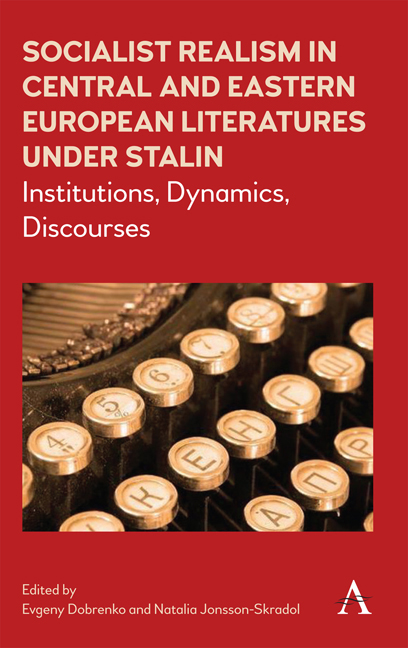 Socialist Realism in Central and Eastern European Literatures under Stalin
Socialist Realism in Central and Eastern European Literatures under Stalin Book contents
- Frontmatter
- Contents
- Acknowledgements
- Introduction
- Part 1 Institutions
- Part 2 Dynamics
- 8 Socialist Writers and Intellectuals in a Divided Nation: The Early GDR Experience
- 9 Stalinism's Imperial Figure: Hero or Clerk of the Pax Sovietica?
- 10 From Avant-Garde to Socialist Realism: Continuities and Discontinuities in Hungarian and Romanian Literature
- 11 The Short Life of Socialist Realism in Croatian Literature, 1945–55
- 12 Literature in Socialist Yugoslavia: Constructing Collective Memory, Institutionalizing the Cultural Field
- 13 ‘Yesterday and Tomorrow’: The Forms of the Slovak Literature of Socialist Realism, 1945–56
- 14 Socialist or Realist: The Poetics of Politics in Sovietized Hungary
- Part 3 Discourses
- Conclusion
- List of Contributors
- Index
11 - The Short Life of Socialist Realism in Croatian Literature, 1945–55
from Part 2 - Dynamics
Published online by Cambridge University Press: 10 May 2018
- Frontmatter
- Contents
- Acknowledgements
- Introduction
- Part 1 Institutions
- Part 2 Dynamics
- 8 Socialist Writers and Intellectuals in a Divided Nation: The Early GDR Experience
- 9 Stalinism's Imperial Figure: Hero or Clerk of the Pax Sovietica?
- 10 From Avant-Garde to Socialist Realism: Continuities and Discontinuities in Hungarian and Romanian Literature
- 11 The Short Life of Socialist Realism in Croatian Literature, 1945–55
- 12 Literature in Socialist Yugoslavia: Constructing Collective Memory, Institutionalizing the Cultural Field
- 13 ‘Yesterday and Tomorrow’: The Forms of the Slovak Literature of Socialist Realism, 1945–56
- 14 Socialist or Realist: The Poetics of Politics in Sovietized Hungary
- Part 3 Discourses
- Conclusion
- List of Contributors
- Index
Summary
Introduction
The topic of Croatian– Soviet relations in the Croatian humanities has recently been a popular subject of historical research. It marks the beginning of a reinterpretation of one of the most important foreign influences in Yugoslav history, one that had a significant impact on the development of its culture and art in the second half of the twentieth century.
However, when it comes to the history of literature, the situation is much more complicated. Today we have studies that examine the impact of the Communist Party on literature and publication policies, blaming the Soviet model of socialism for low- quality literary works devoid of any value whatsoever, but there are no systematic analyses of various aspects of Croatian literature based on which one could identify specific features of literary Sovietization in the country. The word ‘Sovietization’ itself was often used simply as a synonym for degradation and culturecide in the second half of the twentieth century. Furthermore, there are no systematic overviews of stylistic and institutional deviations from the Soviet model. The aim of this chapter is to revise some generally accepted definitions of Sovietization in Croatian art and culture, bring some forgotten publications back to light, provide some specific data and offer insight into what that distinct phenomenon – Croatian socialist realism – actually was.
In the years after World War II a new identity of Croatian Yugoslav literature was formed under the watchful eye of the Soviets. However, this first post- war decade was also a time of extremely heterogeneous practices – both at the institutional level and at the level of creative experiments. At that time literature was dependent on the extratextual climate more than ever before, with specific socio- political regulations and directives defining its further development, determining both its content and its form, seeking to deprive it of autonomy. The political imperative of the Communist Party was perfectly transparent, its goal being socialism of the Stalinist type. Almost all the leading Croatian historians, from Ivo Goldstein and Ivo Banac to Dušan Bilandžić, agree on this. But it is also significant that over a short period of time Croatian literature, like all the other domains of the arts, was subjected to two opposite political strategies – an initial Sovietization (1945– 48) followed by a fierce de- Sovietization (the late 1940s and early 1950s).
- Type
- Chapter
- Information
- Socialist Realism in Central and Eastern European Literatures under StalinInstitutions, Dynamics, Discourses, pp. 165 - 182Publisher: Anthem PressPrint publication year: 2018


